The deeper that sorrow carves into your being the more joy you can contain. Is not the cup that holds your wine the very cup that was burned in the potter’s oven?” ~ Kahlil Gibran (1883-1931)
Your grieving heart … This is probably the most important section of our entire website. If you visit no other page, we suggest that you try to read this one in its entirety. What can this page do for you? It will help you understand grief and the best ways to cope with its stresses. It may make you sad. It’s long, and pretty heavy duty. But you need to know the worst. And the best. Brighter days lie ahead. Keep going.
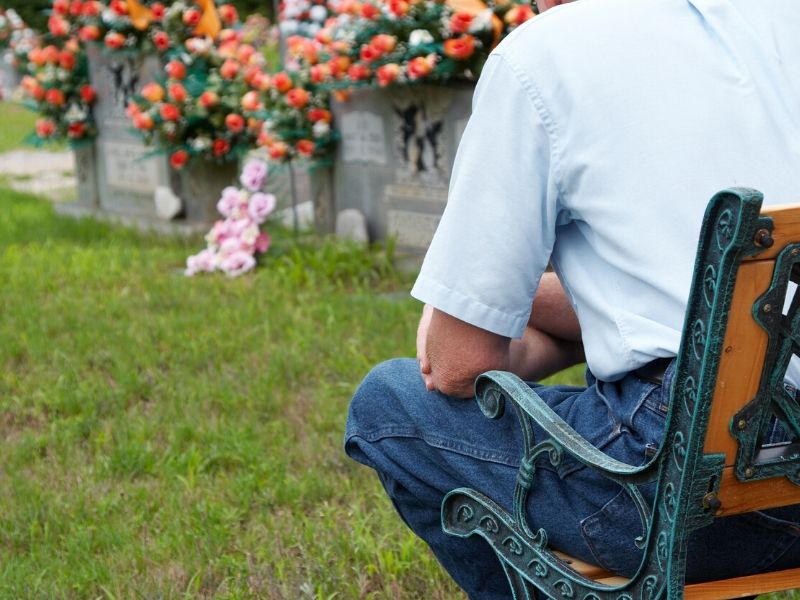
Steps For Healing Your Grieving Heart
Surrender to grief
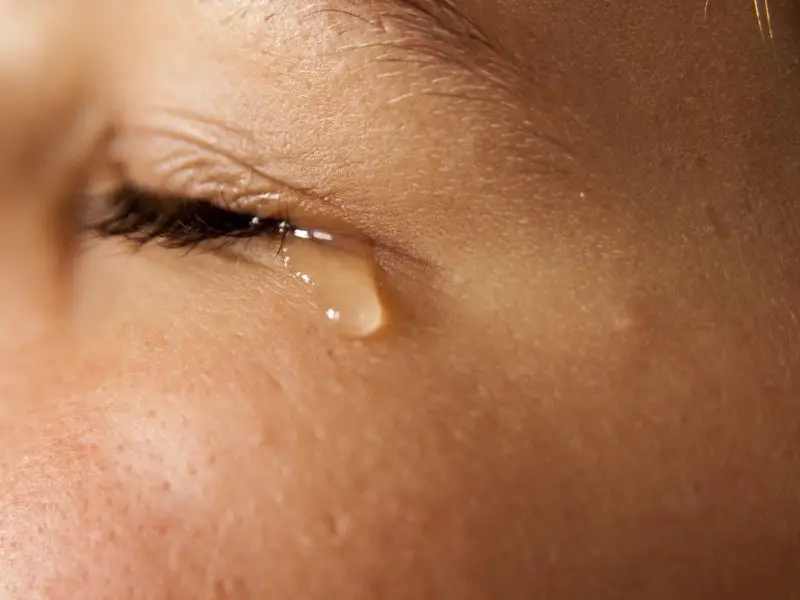
In the beginning, when your grief is new and raw, and overwhelmingly painful and scary, it is important that you not mess with it.
You may tell yourself: “This is just too much to bear! I can’t stand it!” As hard as it may be, however, you must experience the full impact of the loss. Let it wash over your soul at will. Follow it, cry when you want, talk to God, scream into your pillow. Don’t suppress new grief, or avoid it, or try to change it.
It’s your grief! Claim it. Experience it. Surrender to your grief. And don’t let anyone take away your right to it.
Death makes people uncomfortable. They fear it. They understand why you are bereaved, but they have unrealistic expectations as to how you should grieve, and for how long. Why? Underneath, they are uncomfortable with your grief and want it to go away as soon as possible. That’s why they attempt to comfort you and give you advice and encourage you to “get over it” and “get on with your life” as soon as possible.
Their discomfort and awkwardness with your situation can lead to some pretty severe “foot-in-mouth” disease.
They may even make some incredibly stupid and insensitive remarks like:
- “Thank God you can have more children” (Like it’s a pet turtle that died)
- “She would want you to go on” (How do you know?)
- “I understand how you feel” (You don’t have a clue how I feel)
- “God needed another angel” (Not as much as I needed him)
Try to understand that they mean well, but are acting out of fear and showing a profound ignorance of how a healthy grief process works. Just try to forgive these souls, and spend as little time with them as possible.
Instead, surround yourself with true, stalwart friends, who will silently stand witness to your grief, and not attempt to manipulate it.
Your grieving heart…

In the depths of your despair right now, you likely will not see the wisdom of the grief process. It’s only later, in retrospect, that you’ll realize how miraculously it swept you along toward a successful conclusion, providing just the right thing at just the time you needed it.
The message for you right now is this: trust the grief. As painful as this process is, grief is your friend and will guide you eventually and surely back to life.
You may feel like no one could ever feel the depth of the pain you feel right now. But the fact is that the vast majority of people experience serious grief at some time in their lives, and come through it without suffering permanent harm. But they (and you) cannot escape the powerful process that Sigmund Freud called the “work of mourning”.
And work, it is. Experts agree that it is essential to your future mental health to allow yourself to grieve immediately, when the loss is fresh, and fully, as long as it takes. Do not delay your grief or avoid it. And don’t try to limit how long it lasts.
The only way to heal is to experience all the anger, frustration, and despair. You are destined to shed the tears, drop by drop. There are no short cuts. You don’t “get over” death and grieving, you go through it, step by step. So don’t allow yourself to be “rescued” by well-meaning friends from this important healing work.
Working through the mourning process
There are three major points for you to keep in mind as you go through your “work of mourning”:
- You will have your own unique way of expressing and experiencing grief. As long as it is changing, and moving, and “fluid”, it is normal grieving.
- You are in for the roller coaster ride of your life. It is the nature of the beast. Grief is not orderly and predictable. It will wax and wane. You may reach a period of relative calm, and a break from the tears. “What a relief” you’ll think, “Maybe I’m finally reaching the stage of acceptance”. And then, WHAMO! Brought to your knees again by intense grief. And you’ll wonder if you are making any progress at all. You are. The passage of time assures this.
- It really will come to an end. In its own time. You will come back to life with loving remembrance in your heart, ready to embrace life again without your beloved at your side. You will gradually feel stronger and more in charge of your life. It really does end.
Am I Going Crazy? Signs and symptoms of grief & warning signs
No, you’re not going crazy. And you are also not alone in feeling like you are “losing it”. When you think about the overwhelming loss you’ve experienced, it is indeed a miracle that you don’t lose your sanity!
But there’s a safety net built into the wondrous grief cycle that somehow keeps you safe in the storm. You will survive this, sanity intact, and eventually go on to reclaim your life and some degree of joy, despite your loss.
There are many ways in which grief can touch you: physically, mentally, emotionally, and spiritually. It’s an all-encompassing thing, you know? You need to understand that there is a wide range of “grief symptoms”, and you may wonder what is “normal” and what is not. Rest assured that almost ANY symptom you might have, although it would be considered alarming otherwise, is perfectly normal during grieving.
Learn more about what’s normal, warning signs, when to get outside help, and some truly bizarre experiences you may have: signs and symptoms of grief.
What Happened To Your Loved One? Types of Death & Reactive Grief
The death of a beloved one is always difficult. Your reactions and the length and breadth of your grief will depend on two major factors:
- your relationship with the person
- the circumstances of their death
To keep things simple for you, we’ll break it down this way: there are just three types of grief.
- Anticipatory grief
- Sudden loss
- Complicated grief
1. Anticipatory Grief is when the death was expected, as in a long illness, or the natural death of an elderly relative (“old age”). You are able to anticipate the loss, and prepare for it to some degree. Now, this is not to say that you’ll have an easy time of it, or your grief will be shorter. But the anticipatory loss does allow you some time to adjust to the idea of life without your loved one.
The death, although still very traumatic and devastating when it comes, is not as big a shock as the sudden loss is. You might have had the opportunity to complete “unfinished business” with the dying person, such as saying “I love you”, “I forgive you”, or even just “goodbye”. Because you started grieving earlier, you may be able to recover sooner.
2. Sudden Loss is the second type of grief. Now, this is a “catch-all” phrase that applies to many different circumstances of death. They all were unexpected and may cause you to go into “shock” or be overwhelmed by the suddenness of the tragedy. It may take much longer to accept reality, and so the grief process will take longer.
Even though it was a sudden death, though, you may go on to a fairly normal grief experience. Sometimes, it may become a complicated grief, which is discussed in #3, below. Sudden loss can occur due to the trauma of a heart attack or stroke, or an accident.
Read more about trauma & accidents here.
3. Complicated Grief is the final type of loss. This is when the grieving process does not progress over time as it should. The intensity of feelings and length of time is severe and prolonged and interferes with your ability to function. You may even fall into a true depression or anxiety disorder.
The hallmark of complicated grief is that the thoughts, reactions, and behaviors do not change or improve as time goes on. Most people know when they are stuck in a grief that will not resolve. Complicated grief usually will not conclude on its own, and requires the help of a professional counselor to resolve it.
There are some situations that tend to create complicated grief. Not always, but often. These circumstances are:
- a violent death
- homicide
- suicide
- AIDS
- multiple loss (as in a car crash)
- loss where you might be responsible in some way for the death
- death of a child
- loss of a parent when you are a child
- miscarriage/stillbirth/abortion
- deaths involving legal proceedings or media attention
Grief Coping Strategies – A Practical Guide to Survival
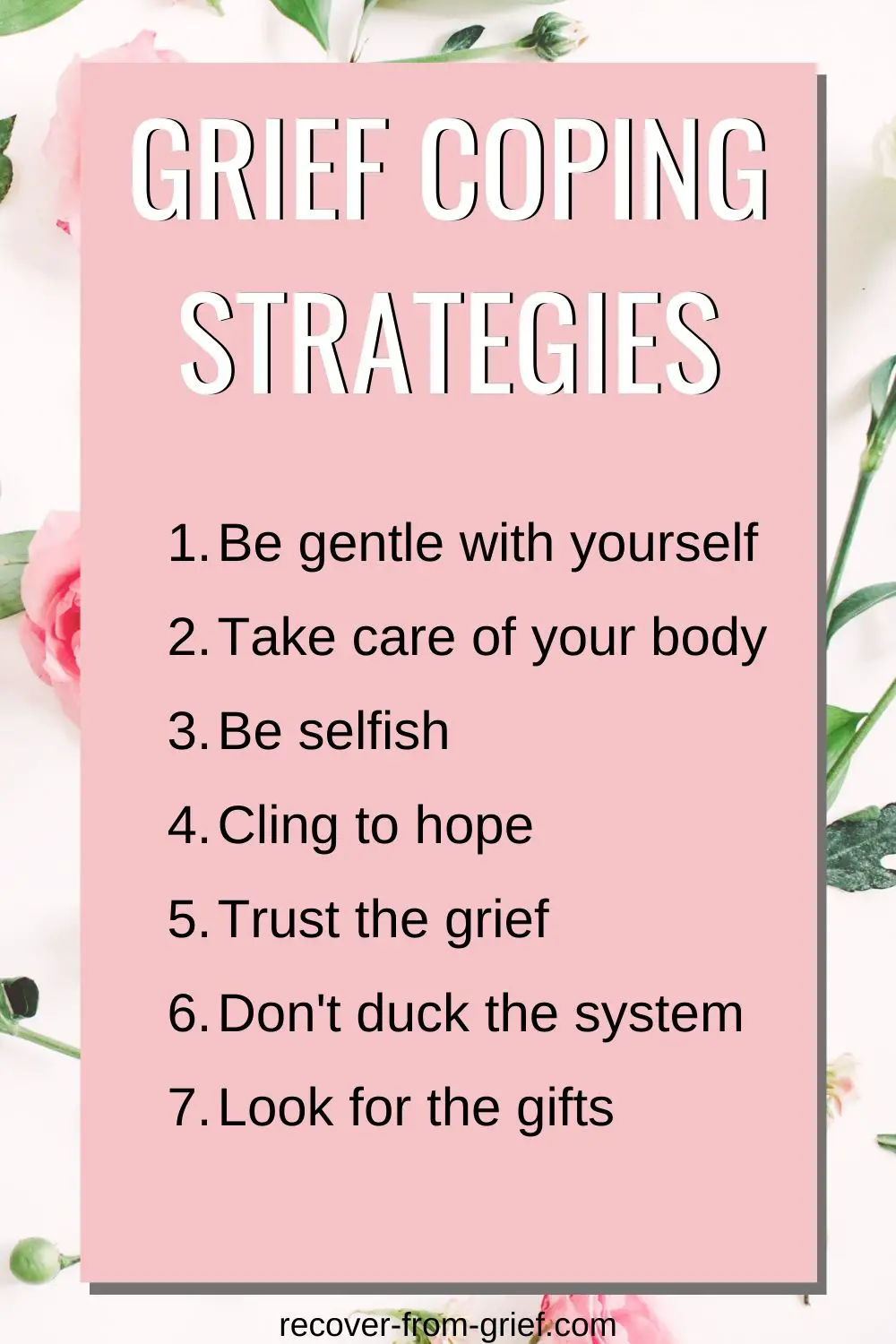
Below we provide a quick listing of some proven strategies that may help you through a healthy and effective grief experience:
- Be gentle with yourself – and patient. It takes a long time to heal. Some days will be better than others.
- Take care of your body – You’ll need it later. Eat healthy, even though you might find it hard to even eat right now. Get some stress vitamins and take one every day. Get some exercise. You don’t have to get crazy with this. Just make yourself get out in the fresh air for a brisk walk or jog every day or two.
- Be selfish – demand the right to grieve in your own way. It is not their bereavement, it’s yours. You have nothing to offer other people right now anyway. Focus on yourself and your needs. Surround yourself with supportive loved ones.
- Cling to hope – Things will get better, honest. Don’t tell yourself “It’s going to be alright”. Instead, tell yourself “I will survive”.
- Trust the grief – It’s your best friend right now. Go where it leads you.
- Don’t duck the system – It may be tempting to numb the pain of grief with alcohol or drugs, even prescription drugs. But everything will have to be faced and experienced sooner or later. Sooner is much better.
- Look for the gifts – They may be tiny, but they are life-sustaining, and they are there.
***For a more comprehensive look at some really practical and helpful grief coping strategies, click through to Coping strategies for your grieving heart.
When Will This All Stop? The End of Grieving – Things to look forward to

How long does it take for grieving to end?
As you read this, your loss may still be fresh, raw, and excruciating. You may find it hard to believe you can ever recover or heal from this horrible thing. It will take a long time, there’s no way around that. But we include here a brief description of what usually happens after your grieving is finished, so you can survive now, with hope in the back of your mind. There are brighter days ahead.
The grieving process is a very personal and individual thing. Your unique relationship with your loved one and the manner in which he/she died will dictate the length and depth of your own “roller coaster ride”. As we have said several times, there is no healthy way to shorten the process; there are no short cuts to the resolution of grief. You must let it run its course.
There is also no “normal” amount of time for mourning. Some people adjust to a new life in a matter of months. Others take a year or more, or up to 2 years or longer to complete their grieving. Most take a year or two. The best length of time for you? Whatever you need.
Even after you are “done”, you may experience grief feelings from time to time, especially during special dates and anniversaries, or during holidays. Expect it.
The end of grief does not mean that you forget your beloved, or cease to love them. When you experience a tragic loss, it breaks your heart.
- Can you mend your broken heart? Yes.
- Does this mean that you are dishonoring your loved one? No.
- Will you ever forget them? No.
- Will they always have a place in your heart? Yes.
Your Grieving Heart

The grieving process creates change in your life and in yourself that allows you to gradually relinquish your need for the lost one. Grief helps you come to terms with this, and to refocus your energies toward the future. Grief is not about “returning to normal”. You will never be the same as you were. Grief is about finding a new life order for yourself.
As hard as you may find this to believe right now, the pain will eventually ease up and allow you to reinvent your life and your identity. You will reinvest in life and find yourself planning for the future with some degree of joy in being alive.
You will begin to sense some new beginnings and experience a new dawning of life that slowly replaces the previous despair and desolation and darkness.
“The pain passes, but the beauty remains”. ~Pierre-Auguste Renoir (1841-1919)
Helpful Resources

~Are you devastated by the loss of a loved one?
~Bewildered by all the strong emotions and crazy symptoms?
~Wondering how you are ever going to survive?
~Tired of being stuck in a complicated grief?
Back To Life! Our Personal Grief Guidebook might be just the help you are looking for. Read more about this most useful and practical recovery guide here:
Back To Life!
In addition to the written guidebook, we also offer a unique audio program to help with grief coping and relaxation. If you think an audio approach might be helpful, consider this program:
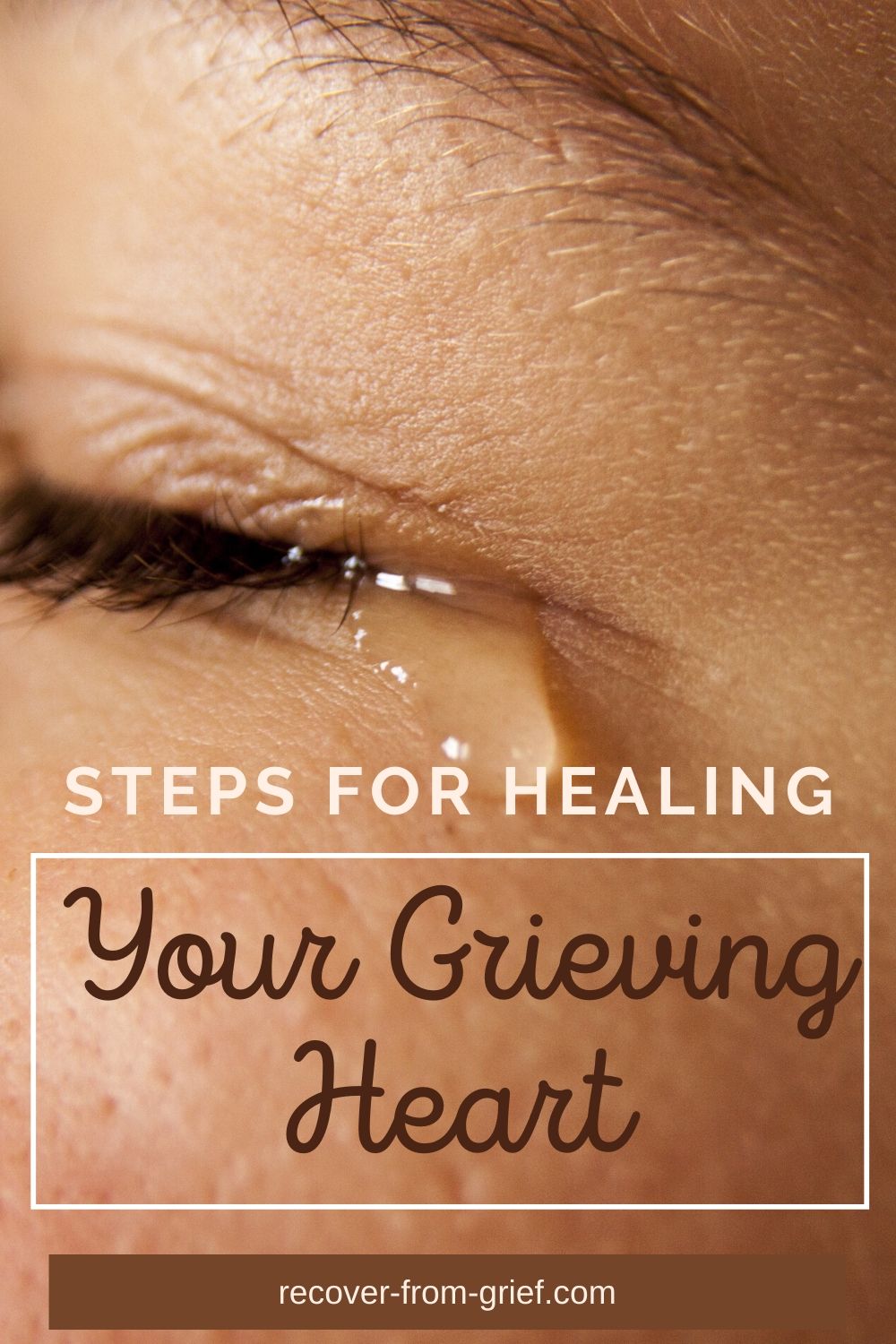

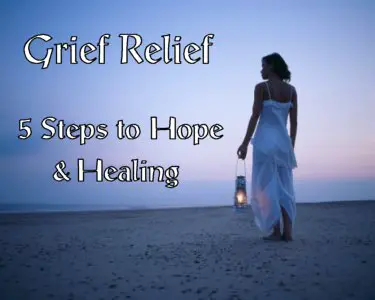
I just lost my baby dog scrappy. I came home from work and found him dead. I’m heartbroken, he was my baby for nearly 12 years. How do I get up and go on. All can do is cry.
I’m so sorry for your loss :'(. I have some help on pet loss here: https://www.recover-from-grief.com/category/pet-loss-corner. I hope it it helps. you are in my prayers.